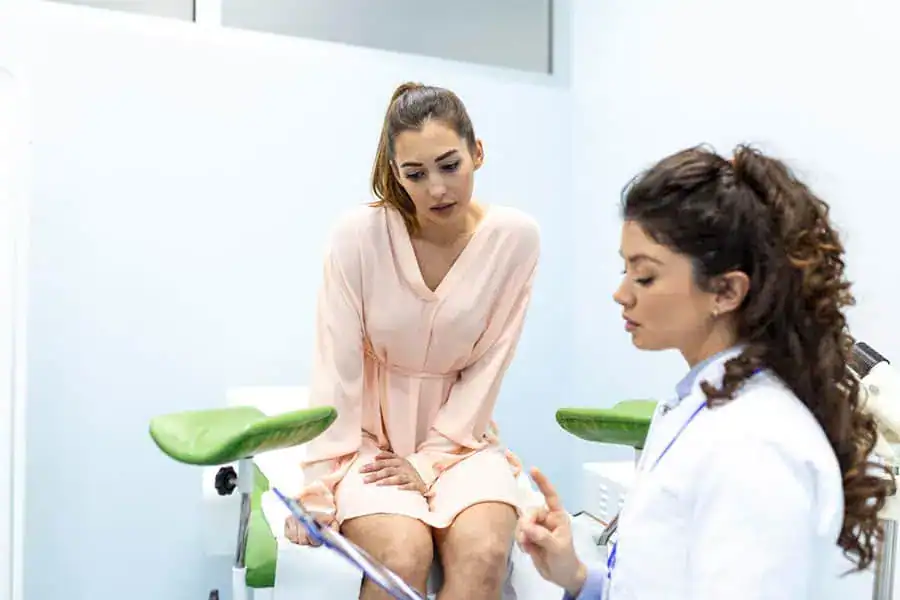Why Am I Not Ovulating but Having Periods? A Miami Gardens Guide

By Miami Gardens Gynecology Specialists - Board-Certified Reproductive Health Experts
What if we told you that 1 in 10 women experience periods without actually ovulating? According to research from the National Institutes of Health, anovulatory cycles affect millions of women nationwide—and it's especially common in South Florida.
You might be experiencing this right now. Your period shows up, but something feels off. Clinical data shows that 25% of fertility patients have undiagnosed anovulation, even if they have regular vaginal bleeding. If your cycle feels off, this guide covers some of the most common reasons women stop ovulating — even when periods still show up. But everybody is different. If you’re concerned, an annual gynecology exam in Miami Gardens is the best next step.
What Is Anovulation? (And Why Your "Period" Isn't Really a Period)
Anovulation happens when your uterus sheds its lining (called the endometrium) without releasing an egg. This occurs in 8–12% of all menstrual cycles.
During an anovulatory cycle, your brain and pituitary gland still make hormones that cause menstrual bleeding. But your ovaries don’t release an egg. Since there’s no egg, pregnancy can’t happen during that cycle.
Learn more about ovulation and pregnancy possibilities in our comprehensive guide.
The Clinical Signs Your Body Is Giving You
At All-Inclusive Preventive Care, we treat more than 2,000 women each year. These are the most common symptoms of anovulation we see in our Miami Gardens clinic:
5 Warning Signs You're Not Ovulating
1. Irregular Bleeding Patterns
- Light or short periods - periods that last less than 3 days
- Unpredictable menstrual cycle timing - the onset of menstruation varies by more than 7 days from when it would normally start
- Abnormal uterine bleeding - unusually heavy menstrual bleeding or bleeding that occurs mid-cycle
2. Missing Ovulation Indicator
- No fertile cervical mucus (CM) - clear, egg white-like discharge from the cervix mid-cycle
- Flat basal body temperature - no post-ovulation temperature rise
- Negative ovulation predictor tests consistently
3. Hormonal Symptoms
- Persistent acne or skin changes due to androgen levels
- Unexplained weight gain or difficulty with weight loss
- Mood fluctuations without a cyclical pattern
4. Fertility Challenges
- 12+ months trying to conceive without success
- Previous miscarriage in early stages
- Irregular ovulation predictor results showing
5. Physical Changes
- Breast tenderness without a cyclical pattern
- Pelvic pain in the pelvis area at unusual times
- Changes in libido (sex drive) throughout the cycle
The Root Causes: What Research Reveals About Anovulation
Hormonal Disorders (Leading Cause of Not Ovulating - 40% of Cases)
- Polycystic Ovary Syndrome (PCOS): Affects 1 in 10 women. It causes high levels of male hormones (androgens) and insulin resistance. You may notice acne, weight gain, or excess facial/body hair. Learn more about PCOS diagnosis and treatment options.
- Thyroid Dysfunction: An overactive (hyperthyroidism) or underactive (hypothyroidism) thyroid can disrupt hormones that control ovulation. Read our comprehensive guide on hypothyroidism and reproductive health.
- High Prolactin Levels: This hormone helps with milk production but can cause irregular periods or even stop ovulation when levels are too high.
Lifestyle Factors (Reasons for Not Ovulating - 30% of Cases)
Research published in Fertility and Sterility shows:
- Body Mass Index (BMI): Being underweight (BMI<18.5) or overweight (BMI>30) increases anovulation risk by 300%. Learn about our medical weight loss programs for healthy weight management.
- Excessive Exercise: 7 hours weekly high-intensity exercise can disrupt hormone production and how your body regulates your internal temperature
- Chronic Stress: When you’re stressed for a long time, your body makes more of a hormone called cortisol. High cortisol levels can block the hormones that control ovulation. This may lead to a condition called functional hypothalamic amenorrhea, where your periods stop even though there’s no physical problem with your ovaries.
Age-Related Changes (Reason for No Ovulation - 25% of Cases)
- Perimenopause: Usually begins 8–10 years before the onset of menopause. After age 35, anovulatory cycles become more common as the female reproductive system naturally slows egg production. Understanding menopause symptoms and treatment can help manage this transition.
- Premature ovarian insufficiency (POI): A condition where the ovaries stop working early. POI affects about 1 in 100 women under 40. It’s often linked to autoimmune or genetic conditions that affect the endocrine system.
How We Diagnose Anovulation in Miami Gardens
At All-Inclusive Preventive Care, we use a step-by-step approach to help you understand your cycle:
Comprehensive Hormone Blood Test Panel
At our Miami Gardens clinic, we make it easy to get the blood tests you need. We collect your sample in-office and send it to a certified lab for fast results. Here’s what we test and what each one tells us:
- Day 3 FSH and LH levels: These hormones help us understand how your ovaries are working at the start of your cycle. FSH stands for follicle stimulating hormone and LH stands for luteinizing hormone — both are key in preparing your body to release an egg.
- Mid-luteal progesterone: This test checks if you actually ovulated. Progesterone rises after ovulation, so testing it during the second half of your cycle (the luteal phase) helps confirm if an egg was released.
- Anti-Müllerian Hormone (AMH): AMH shows how many eggs you still have. This is called your ovarian reserve. It helps us understand your fertility health over time.
- Metabolic panel: This checks things like insulin levels, blood sugar (for diabetes risk), and thyroid hormones, which all play a role in ovulation.
- Estradiol and gonadotropins: These are other key reproductive hormones that support egg growth and release.
- Vitamin D and B levels: Low levels of these vitamins can affect hormone balance and overall reproductive health.
Advanced Imaging & At-Home Ovulation Tracking
Ultrasound Imaging at Our Clinic
We use a special type of ultrasound called follicular monitoring to see what’s happening in your ovaries. This gives us a live look at your egg development. When combined with hormone blood tests, this method is about 95% accurate in confirming if you’ve ovulated.
At-Home Tracking Tools
You can also monitor your cycle at home using simple methods:
- Basal body temperature (BBT) – Take your temperature every morning. A small rise (over 0.4°F) after mid-cycle usually means you’ve ovulated.
- Cervical mucus – Check for clear, stretchy discharge mid-cycle, which helps sperm travel and signals ovulation.
- Ovulation predictor kits (OPKs) – These FDA-approved urine tests detect a hormone surge (luteinizing hormone or LH) that happens right before you ovulate.
These tools are helpful, especially when combined with guidance from your gynecologist.

Treatment Options for Anovulation: What to Expect
At All-Inclusive Preventive Care in Miami Gardens, we focus on helping you find the cause of irregular cycles and guide you toward the right next steps. Some treatments can be done here in our office, while others may require a referral to a fertility specialist.
First-Line Support: Lifestyle & Wellness Changes
For many patients, making changes to daily habits is the first and most effective step. We support:
- Weight management: Losing or gaining just 5–10% of your body weight can help restart ovulation. We provide support through our medical weight loss program and work with you to reach a healthy BMI.
- Stress reduction: Stress can affect hormone balance. We’ll talk with you about ways to manage it, such as breathing techniques, mindfulness, or yoga.
- Nutrition support: We can help you develop healthier eating habits through basic nutritional guidance.
- Supplement support: Our providers may recommend vitamins or nutrients such as CoQ10, inositol, or B vitamins to support your body’s natural balance.
Medication & Hormone Management (If Needed)
If lifestyle support isn’t enough, we may order labs and help manage related conditions. In some cases, medication may help:
- Thyroid medication: If you have hypothyroidism, we can help monitor and manage your thyroid levels.
- Insulin resistance: If your blood sugar is affecting ovulation, we may prescribe medication or refer you to an endocrinologist.
- Cycle regulation: Birth control may sometimes be used to help regulate your cycle before trying to conceive.
For more advanced medication like letrozole or gonadotropin therapy, we may refer you to a trusted fertility clinic.
Hormonal Support & Monitoring
Some women may benefit from hormone therapy if levels are very low due to perimenopause or other factors. We can check your hormone levels and discuss next steps, including bioidentical hormone therapy if appropriate.
Referrals for Fertility Treatment
If you’re trying to get pregnant and not ovulating regularly, we can refer you to a reproductive endocrinologist. They may recommend:
- Ovulation induction with hormones
- Intrauterine insemination (IUI)
- In vitro fertilization (IVF)
- Egg donation or surrogacy
- Embryo transfer or monitoring
We’ll help coordinate your care and make sure you feel supported every step of the way.
When to See a Doctor About Irregular Cycles
If your cycle feels unusual or you’re noticing symptoms like:
- No period for 3+ months (and you're not pregnant)
- Ongoing pelvic pain or irregular bleeding
- Unusual hair growth, acne, or breast discharge
- Trouble getting pregnant after trying for 6–12 months
…it’s time to talk to a gynecologist.
🏥 Don’t wait for symptoms to get worse. Annual gynecological exams checkups help catch hormone issues early — and get you on the right track with treatment or referrals if needed.
Take Action: Your Path to Hormonal Health
Don't wait another cycle wondering what's wrong. Whether it's PCOS, thyroid changes, stress, or other hormone-related causes, our team is here to help you understand what’s going on and guide your next steps. Schedule your comprehensive evaluation today:
🌐 Book online - Most insurance plans accepted for health care services
Schedule your appointment today at our Miami medical clinic or request an appointment online.
📞 (305) 200-3141 | 📍 16361 NW 57th Ave, Miami Gardens, FL 33169
Experienced gynecologists with over 20 years combined expertise in reproductive health
related-womens-health-resources
Explore more about reproductive health:
